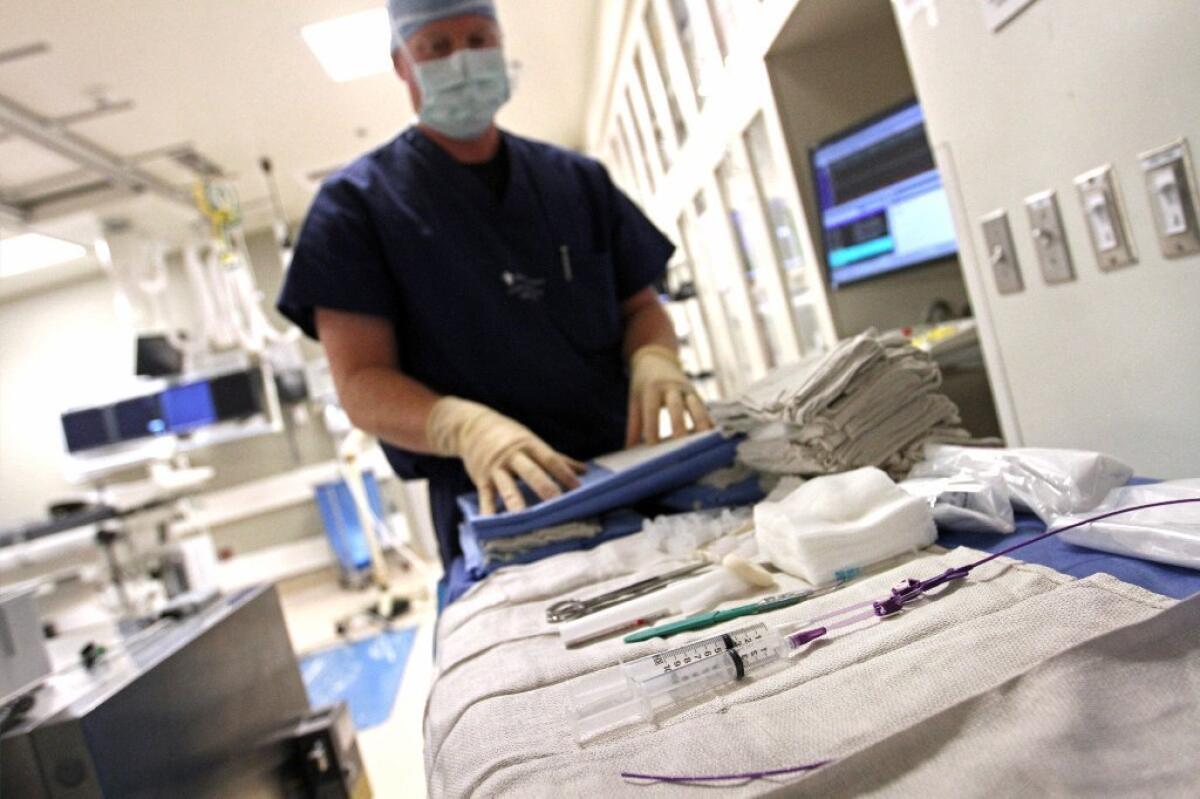California’s 2012 budget crisis sparked Prop. 52, a measure to generate money for Medi-Cal

- Share via
Reporting from Sacramento — Californians wading through the long list of statewide ballot measures on Nov. 8 may wonder why they are being asked to weigh in on Proposition 52, a wonky measure to generate money for Medi-Cal, the state’s subsidized healthcare program for the poor.
The answer dates back to a state budget crisis in 2012.
“What really triggered it for us was going through that economic downturn,” said Anne McLeod, a senior vice president at the California Hospital Assn. “When the people needed the program the most, that’s when the state dipped in and took more. That’s when we knew we had to stop that.”
Proposition 52 would make it harder for lawmakers to change the way money is allocated from a program where California hospitals contribute money to Medi-Cal. This fee paid by hospitals triggers a federal contribution to Medi-Cal that results in a net benefit to hospitals.
The hospital fee program is scheduled to expire in 2018. In addition to solidifying the way the money is allocated, Proposition 52 would make the program permanent.
Hospitals paid $4.6 billion through the hospital fee program during the fiscal year that ended in June 2016. Most of the money went to hospitals for Medi-Cal payments and grants. Some money also went to the state’s general fund.
By law, money from the program that goes into the general fund is used to offset costs for children in the Medi-Cal program. Changes to the amount of money used for that purpose prompted hospitals to take the issue to the ballot.
The California Hospital Assn. is sponsoring the initiative, which has no active opposition.
The initiative’s supporters point to decisions made by lawmakers and Gov. Jerry Brown during a 2012 budget crisis as the spark that prompted their campaign.
The Legislature took a larger portion of the fee program for the general fund than the hospitals believed was fair, McLeod said. At least $260 million originally slated to fund hospitals was moved to the general fund.
Sign up for our Essential Politics newsletter »
Some of that money would have funded grants for public hospitals that treat Medi-Cal patients if it hadn’t been diverted, McLeod said. The hospitals that receive these grants are typically county hospitals in urban areas that treat large homeless populations, she said.
“That was a big wake-up call to us,” McLeod said. “We worked very hard to make the legislation very careful and very fair as to how much the state would get and how much the hospitals would get… And we found that in difficult times, none of that really mattered.”
But it wasn’t just hospitals that were unhappy with budget negotiations that year. Lawmakers were slashing costs across the board during the budget crisis, said Los Angeles City Councilman Bob Blumenfield, who was chairman of the Assembly’s budget committee in 2012. He rejected the characterization of the funds as a diversion, noting that the money that went into the general fund was still spent on healthcare.
“We were cutting everything to the bone,” Blumenfield said. “During my time, I don’t think there was ever inappropriate diversion of money into the general fund.”
The program Proposition 52 would make permanent began in 2009 and has been reauthorized by the Legislature several times.
“Even though the Legislature has been very supportive of this program, there’s political uncertainty when you have a program that [needs renewal] every year or every couple of years,” Proposition 52 spokesman Kevin Riggs said.
Hospitals and other supporters have put nearly $60 million into their initiative campaign. Proposition 52 was the first measure that qualified for the November ballot, after supporters submitted voter signatures in 2014 too late to qualify for that year’s fall ballot.
The initiative’s only announced opposition comes from the Service Employees International Union-United Healthcare Workers West, which argues Proposition 52 would allow hospital executives to misuse the money it generates.
The union set aside nearly $19 million to oppose the measure, but a spokesman said SEIU-UHW has now decided to spend most of that money on other issues.
Although the proposition would give lawmakers less flexibility to change the way the money is allocated, Blumenfield said the hospital fee it would protect is a “win-win” for the state and the hospitals.
“I’m absolutely for Prop. 52,” he said. “The good part about doing it through an initiative rather than through the Legislature [is] then it won’t become fodder for political issues when people don’t want to pass a fee or a tax.”
Follow @SophiaBollag on Twitter.
ALSO
What you need to know about Prop. 61, the spendy prescription drug measure on November’s ballot
The money is starting to roll in on California’s 17 ballot propositions. A lot of it
More to Read
Get the L.A. Times Politics newsletter
Deeply reported insights into legislation, politics and policy from Sacramento, Washington and beyond. In your inbox three times per week.
You may occasionally receive promotional content from the Los Angeles Times.








